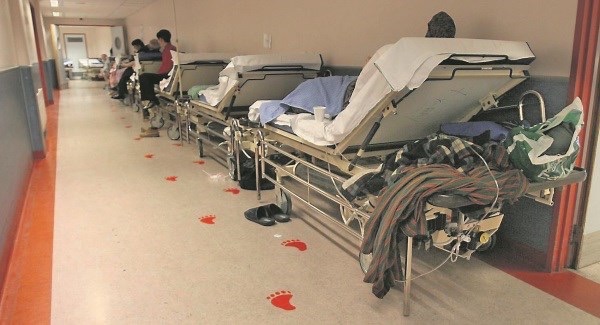
The number of patients waiting for a hospital bed on trolleys in the 26 Counties reached a record earlier this week as the Dublin government admitted it was baffled by its own failures.
A total of 656 patients were left on a trolley in a single day according to the Irish Nurses and Midwives Organisation (INMO). Full year figures from the INMO also showed a record total of 98,981 patients admitted to hospitals in the 26 Counties were left waiting on a trolley, a 6 per cent rise on last year.
Sinn Fein Health Spokesperson Deputy Louise O’Reilly said that the government and the Minister for Health had entered 2018 in the “exact same position” they have left 2017, “failing patients and failing the health service”.
“Consistently the Minister and this government hold their hands up in January and protest that they could never have known that during the height of winter that flu could be so widespread,” she said.
“This utter nonsense must stop; everyone, and I mean everyone, knows that these pressures come on the health service in the winter. We need action to deal with the trolley crisis, not faux surprise that people get the flu during winter.”
Taoiseach Leo Varadkar on Thursday apologised to patients who had experienced long delays and waits on trolleys in emergency departments.
During a visit to Hungary, the Taoiseach expressed regret and frustration at the situation, and over the fact that there has not been an improvement despite increased investment over the last three years.
“This is the third year in a row that we’ve had more resources, a bigger budget, more staff, more beds, more home care, and despite all that we haven’t seen an improvement,” he said.
He claimed the numbers are coming down and the situation should stabilise in the next few days. He also defended Minister for Health Simon Harris, saying it is “a very difficult job” and he is “very satisfied” with his performance.
The Irish Medical Organisation (IMO) said it was exasperated at the comments.
IMO president Dr Ann Hogan said it was “a shameful indictment of the political system” that the Taoiseach promised on Thursday that the situation in the hospital system would stabilise soon.
She said that Mr Varadkar’s “version of stability involves a 92 per cent bed occupancy on average, 500-plus patients waiting for admission on trolleys, almost 700,000 patients waiting for an outpatient appointment, an ever-increasing number of cancelled operations and procedures, and a general practice system which is struggling to meet demand and is near to collapse. Is that what is acceptable to the Taoiseach as stability?”
Dr Hogan said the Taoiseach and his government “must publicly commit to funding and investing in our health services so that we can finally move away from the current pattern of crisis to chaos and back again”.
She said Mr Varadkar’s comments “reflected a shocking ignorance of the health services and the impact of years of austerity which was particularly worrying given the Taoiseach is a former minister for health”.
“At every budget for the past five years we have warned that the supposed ‘increases’ in the health budgets were mirages, and they would not even keep pace with the underlying cost increases in the services.
“Any increases in the health budget hardly maintain existing levels of services let alone deal with the projected demand based on known demographics and the increase in the elderly population who have complex healthcare requirements.
“We thought that successive Ministers were trying to fool the public...now it seems that they fooled themselves as well.”
![[Irish Republican News]](https://republican-news.org/graphics/title_gifs/rn.gif)
![[Irish Republican News]](https://republican-news.org/graphics/title_gifs/harp.gif)

